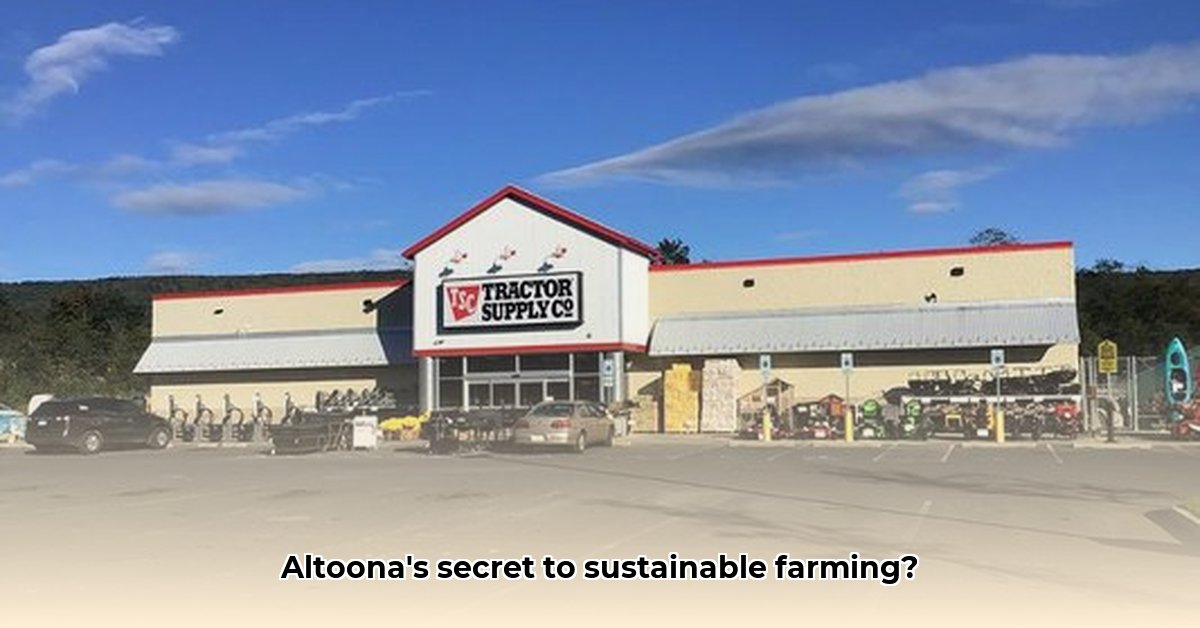
Tractor Supply Altoona Pennsylvania: A Partner in Sustainable Agriculture?
Tractor Supply Company (TSC) holds a significant position in the Altoona, Pennsylvania agricultural landscape. More than just a retail outlet, TSC's influence extends to the sustainability of local farming practices. This article explores the ways TSC contributes to sustainable agriculture, identifies areas for improvement, and offers actionable recommendations for farmers, consumers, and the company itself. We'll examine whether TSC is truly a partner in creating a more environmentally friendly future for Altoona's agricultural community. For more information on the Altoona store, visit the Altoona TSC.
Supporting Local Sustainable Agriculture: TSC's Current Role
TSC in Altoona plays a crucial role in providing farmers and gardeners access to materials needed for sustainable farming. They stock organic seeds, natural fertilizers, water-wise irrigation tools, and even fencing for rotational grazing – a key regenerative agricultural technique. The convenience of having these supplies locally available empowers individuals to make more environmentally conscious choices. However, the extent of TSC's commitment to sustainability requires closer examination.
Analyzing TSC's Strengths and Weaknesses
TSC's accessibility and product variety are undeniable strengths. The convenience factor significantly lowers the barrier to entry for farmers seeking sustainable options. However, a lack of comprehensive sustainability initiatives and transparency in their supply chain represents a significant weakness. The absence of clear labeling on sustainable products and a lack of educational resources about sustainable farming practices limit their positive impact. This lack of transparency raises questions about the true environmental footprint of their product offerings. How can we be sure that the “eco-friendly” options truly reflect sustainable practices throughout their supply chains?
Actionable Steps for a Greener Future in Altoona
To enhance TSC's contribution to sustainable agriculture in Altoona, several key steps are needed.
For Tractor Supply Company:
Comprehensive Environmental Audit: Conduct a thorough assessment of their entire environmental impact, encompassing supply chains, energy consumption, and waste management. This audit should prioritize transparency in reporting findings and outlining concrete improvement plans.
Certified Sustainable Product Line: Develop a dedicated range of products with clear and verifiable sustainability certifications (e.g., organic, Fair Trade, etc.). This initiative will empower consumers to make fully informed choices.
Renewable Energy Transition: Invest in renewable energy sources (solar, wind) to reduce the carbon footprint of their Altoona store and other locations. Setting ambitious renewable energy targets will demonstrate a strong commitment to sustainability.
Community Education Programs: Partner with local organizations to offer workshops and educational materials promoting sustainable farming practices. This proactive approach connects directly with the community and fosters a shared sense of responsibility.
For Local Farmers and Gardeners:
Informed Purchasing Decisions: Actively seek out and prioritize sustainably sourced products from TSC and other retailers. Read labels carefully and ask questions about product origins.
Implementation of Sustainable Practices: Adopt environmentally friendly farming techniques such as crop rotation, water conservation, and reduced pesticide use. These practices are vital for long-term land health.
Advocacy and Engagement: Support policies and initiatives at the local and state levels that foster sustainable agriculture. Active participation in relevant community discussions is crucial.
For Consumers:
Demand for Transparency: Demand greater transparency from TSC and other retailers regarding product sourcing and environmental impact. Actively engage with companies to promote responsible business practices.
Support Sustainable Businesses: Support businesses that prioritize environmental sustainability in their operations and product offerings. Voting with your wallet sends a powerful message.
Reduce, Reuse, Recycle: Implement the three R's to minimize environmental impact. This simple yet powerful action strategy helps reduce waste and conserves resources.
Conclusion: Collaboration for a Sustainable Future
Creating a more sustainable agricultural system in Altoona requires a collaborative effort. Tractor Supply, local farmers, and conscious consumers must work together, each playing a crucial role in the transformation process. By demanding transparency, embracing sustainable practices, and supporting responsible businesses, Altoona can lead the way in building a more environmentally friendly future for food production. The future of farming depends on our collective action. What will you do to make a difference?